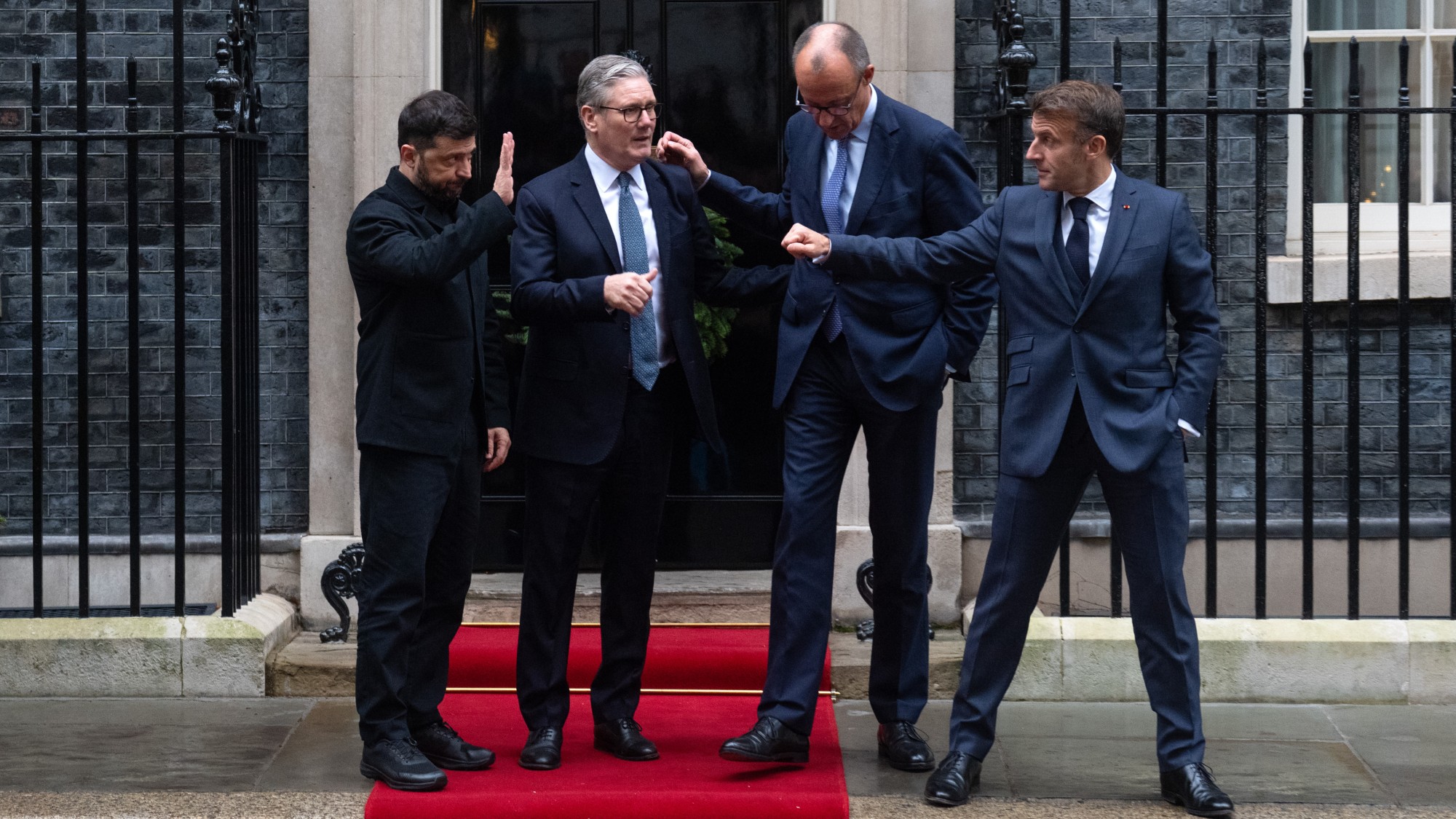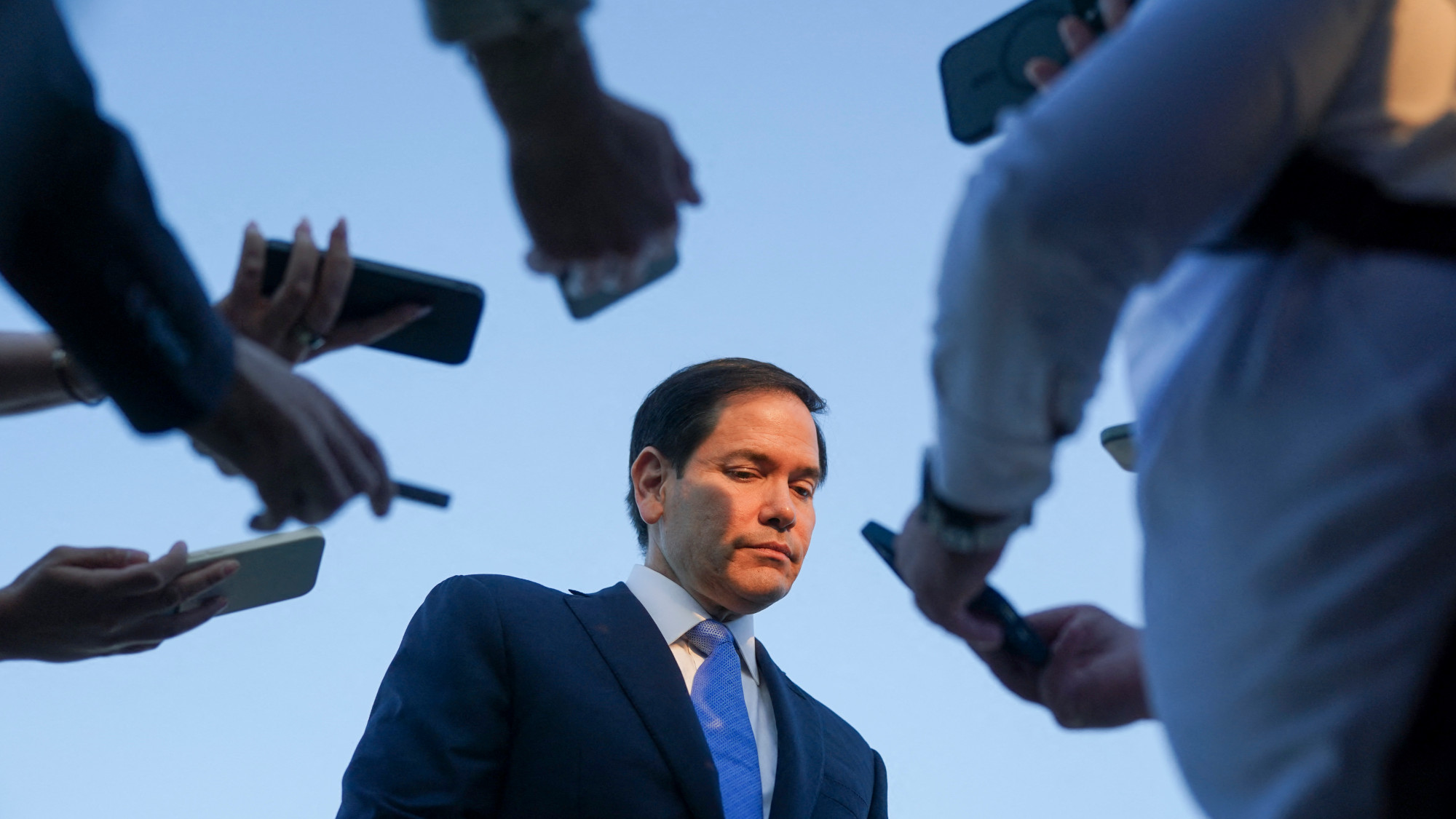Zelensky's speech was heart-rending. It shouldn't change U.S. policy.
To save the world, Ukraine must stand alone


A free daily email with the biggest news stories of the day – and the best features from TheWeek.com
You are now subscribed
Your newsletter sign-up was successful
In his address to Congress Wednesday morning, President Volodymyr Zelensky of Ukraine made a powerful, heartrending appeal for additional aid, including a no-fly zone and additional weaponry, to help his country defend itself against Russia's invasion.
The U.S. government should keep imposing painful economic sanctions on Russia and sending defensive weapons to Ukraine. But nothing in Zelensky's emotionally potent presentation should change President Biden's rejection of a no-fly zone and more escalatory moves on the ground in Ukraine.
That line might prove difficult to hold. As the world has learned in the three weeks since Russia's invasion began, Zelensky is a charismatic leader whose extraordinary courage is his country's most formidable asset against Russia's aggression. On Wednesday, he pulled out all the rhetorical stops, both verbally and visually, in making his case for stepped up American assistance.
The Week
Escape your echo chamber. Get the facts behind the news, plus analysis from multiple perspectives.

Sign up for The Week's Free Newsletters
From our morning news briefing to a weekly Good News Newsletter, get the best of The Week delivered directly to your inbox.
From our morning news briefing to a weekly Good News Newsletter, get the best of The Week delivered directly to your inbox.
He began by evoking America's relatively few memories of the horror of aerial bombardment — at Pearl Harbor on Dec. 7, 1941, and at the World Trade Center and the Pentagon on Sept. 11, 2001. Imagine the shock and terror of those mornings continuing through the afternoon and evening and on through the days and weeks to come — that's the chilling thought Zelensky tried to plant in the minds of his audience before asking (in language drawn from Martin Luther King's "I Have a Dream" speech) for the U.S. to impose a humanitarian no-fly zone.
Then he pivoted to American ideals — our hope for a world of peace and prosperity in which all nations respect human rights and everyone lives in freedom. That set up a brutal contrast to a video Zelensky showed next, with scenes of Ukraine's peaceful cities and happily playing children giving way to images of explosions, collapsing apartment blocks, and dead children on blood-spattered hospital beds. A soundtrack of keening strings made sure no one missed the point: This is happening right now, right before your eyes. You could do more to stop it, yet you are hesitating. Don't let Russian President Vladimir Putin get away with this. Do more to help us defend ourselves and win — or act as passive accomplices in our defeat, which will be a defeat for everyone who shares America's values.
It was impossible to listen to Zelensky's appeal and not be moved. But that doesn't mean we should let ourselves be moved to change course. Americans are fortunate to have a president at this moment who has done so much to help Ukraine, rally Europe against Putin, and impose painful economic penalties on Russia for its actions — while also holding the line on military escalation.
Turn on cable news, scroll through Twitter, or scan the opinion pages of the country's leading newspapers and magazines and you'll be barraged with calls to do more, far more, to defend Ukraine and humiliate Putin. Some of the suggestions are close calls. (I think the case for transferring MiG fighter jets to Ukraine from Poland is strong and worry Biden might have displayed a mite too much caution in nixing the plan.) But most are reckless — highly emotional responses to wrenching events with insufficient care and attention paid to potential dangerous consequences.
A free daily email with the biggest news stories of the day – and the best features from TheWeek.com
A no-fly zone was a bad idea last week, and it's still a bad idea now. Yes, the prospect of any direct military clash between the U.S. or NATO and Russian forces could end in a nuclear conflagration. But there are plenty of possible bad outcomes short of apocalypse.
Enforcing a no-fly zone means engaging and possibly shooting down Russian planes. It also means exposing our pilots to anti-aircraft batteries on the ground, which we would have to neutralize. That means war. Not necessarily involving nukes, but war nonetheless. It's hard to imagine anything more likely to revitalize popular support for Putin and his misbegotten escapade in Ukraine than its transformation into a battle with NATO for Russian honor.
Russia's invasion is going poorly. Putin might still be capable of inflicting pain on civilians, but any hope he might have had to install a puppet regime in Kyiv capable of defending itself against an insurgency, let alone directly occupying Ukraine as a whole, has already slipped away. Hence the compromises Moscow has already begun to offer in peace negotiations. The last thing Zelensky should want to see now is a widening of the war that gives Russia something bigger to fight for.
Ukraine should be seeking, with our support, to grind Putin down, deny him victories, and give him defeats, weakening his negotiating position to such an extent that he's ultimately willing to accept far less than he was seeking when he made the fatal blunder to send Russian troops across the border.
That can happen, but only if we stay the course, resisting the temptation to play a bigger role in the conflict than we already are. That means sticking with Biden's approach: sending weapons and other materiel, squeezing Russia economically, but staying out of the fight, and allowing the Ukrainian people to defend themselves.
Zelensky might not like the prospect of standing alone. But it's by far the best among the bad options confronting his country in its ongoing moment of trial.
Damon Linker is a senior correspondent at TheWeek.com. He is also a former contributing editor at The New Republic and the author of The Theocons and The Religious Test.
-
 What to know before filing your own taxes for the first time
What to know before filing your own taxes for the first timethe explainer Tackle this financial milestone with confidence
-
 The biggest box office flops of the 21st century
The biggest box office flops of the 21st centuryin depth Unnecessary remakes and turgid, expensive CGI-fests highlight this list of these most notorious box-office losers
-
 The 10 most infamous abductions in modern history
The 10 most infamous abductions in modern historyin depth The taking of Savannah Guthrie’s mother, Nancy, is the latest in a long string of high-profile kidnappings
-
 ‘The mark’s significance is psychological, if that’
‘The mark’s significance is psychological, if that’Instant Opinion Opinion, comment and editorials of the day
-
 The billionaires’ wealth tax: a catastrophe for California?
The billionaires’ wealth tax: a catastrophe for California?Talking Point Peter Thiel and Larry Page preparing to change state residency
-
 Vance’s ‘next move will reveal whether the conservative movement can move past Trump’
Vance’s ‘next move will reveal whether the conservative movement can move past Trump’Instant Opinion Opinion, comment and editorials of the day
-
 What have Trump’s Mar-a-Lago summits achieved?
What have Trump’s Mar-a-Lago summits achieved?Today’s big question Zelenskyy and Netanyahu meet the president in his Palm Beach ‘Winter White House’
-
 Bari Weiss’ ‘60 Minutes’ scandal is about more than one report
Bari Weiss’ ‘60 Minutes’ scandal is about more than one reportIN THE SPOTLIGHT By blocking an approved segment on a controversial prison holding US deportees in El Salvador, the editor-in-chief of CBS News has become the main story
-
 Who is paying for Europe’s €90bn Ukraine loan?
Who is paying for Europe’s €90bn Ukraine loan?Today’s Big Question Kyiv secures crucial funding but the EU ‘blinked’ at the chance to strike a bold blow against Russia
-
 Will there be peace before Christmas in Ukraine?
Will there be peace before Christmas in Ukraine?Today's Big Question Discussions over the weekend could see a unified set of proposals from EU, UK and US to present to Moscow
-
 Ukraine and Rubio rewrite Russia’s peace plan
Ukraine and Rubio rewrite Russia’s peace planFeature The only explanation for this confusing series of events is that ‘rival factions’ within the White House fought over the peace plan ‘and made a mess of it’
